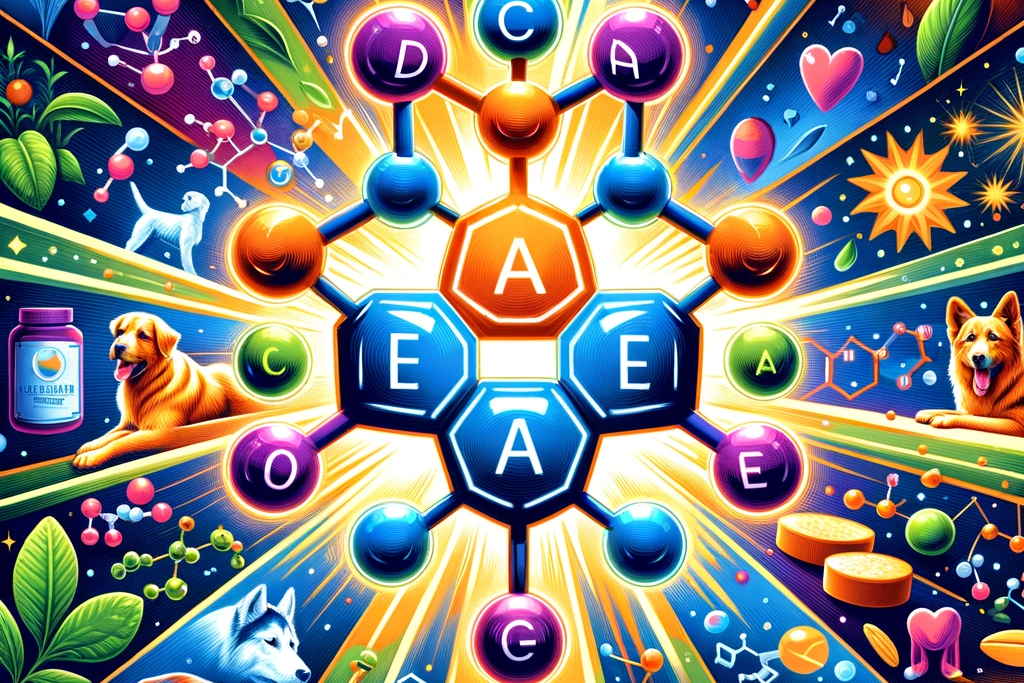Methionine

What is methionine?
Methionine is one of the 20 amino acids that serve as building blocks for proteins. Proteins in turn are responsible for the structure and function of cells, tissues and organs. Methionine is one of the essential amino acids, which means that dogs cannot synthesize it themselves and are therefore dependent on a sufficient dietary supply.
Methionine has several important functions in the body:
- It donates the terminal methyl group for methylation of various compounds. Methylation is a process in which methyl groups are attached to other molecules in order to change their structure or activity. Among other things, methylation is involved in the regulation of genes, the detoxification of harmful substances and the synthesis of neurotransmitters.
- It is a precursor of cysteine, another sulphur-containing amino acid. Cysteine is in turn a component of glutathione, an important antioxidant that protects cells from oxidative stress. Cysteine is also involved in the formation of keratin, a protein that is important for the structure of skin, hair and nails.
- It is a component of collagen, a protein responsible for the structure and elasticity of bones, cartilage, ligaments and tendons.
- It lowers the pH value of urine and makes it more acidic. This can promote the dissolution of struvite stones, which consist of magnesium, ammonium and phosphate and can lead to urinary tract infections or cystitis in dogs.
What are the benefits of methionine for dogs?
Methionine has several health benefits for dogs:
- It supports liver function and helps detoxify harmful substances.
- It promotes wound healing and tissue regeneration.
- It strengthens the immune system and protects against infections.
- It improves coat quality and prevents hair loss.
- It reduces urine odor.
What are the disadvantages of methionine for dogs?
Methionine also has some disadvantages or risks for dogs:
- It can lead to acidification of the urine if supplied in excessive amounts. This can promote the formation of oxalate stones, which consist of calcium and oxalic acid and can also lead to urinary tract problems.
- It can lead to a reduction in biotin absorption if taken in excessive amounts. Biotin is a vitamin that is important for the health of skin, hair and nails.
- It can lead to an increase in the homocysteine level in the blood if it is taken in excessive amounts. Homocysteine is a breakdown product of methionine, which is harmless in normal amounts, but can increase the risk of cardiovascular disease in high amounts.
How much methionine does a dog need?
The optimal amount of methionine for a dog depends on various factors, such as the dog's age, weight, state of health and diet. In general, dogs need a balanced diet with high-quality protein sources that contain all the essential amino acids. Most dog foods contain enough methionine to meet the needs of a healthy dog. However, if the dog suffers from struvite stones or has an increased risk of them, an additional dose of methionine may be useful to acidify the urine and help dissolve the stones. In this case, however, a vet should always be consulted to determine the correct dosage and duration of methionine administration. In addition, the urine pH value should be checked regularly to avoid acidification.
Methionine can be supplied as a natural amino acid (L-methionine) or as a synthetically produced amino acid (DL-methionine). L-methionine is mainly found in animal protein sources such as meat, fish or eggs. DL-methionine is often used as an additive in dog food or as a dietary supplement. Both forms have the same effect on urine pH, but DL-methionine is cheaper and easier to dose.
Methionine is an essential sulphur-containing amino acid that dogs must ingest with their food. Methionine has several important functions in the body, such as methylation, cysteine and collagen synthesis and urinary acidification. Methionine has several health benefits for dogs, such as supporting liver function, wound healing, the immune system and coat quality. However, methionine also has some disadvantages or risks for dogs, such as acidifying the urine, reducing biotin absorption and increasing homocysteine levels. The optimal amount of methionine for a dog depends on various factors and should be adjusted individually. In dogs with struvite stones, an additional dose of methionine may be useful to acidify the urine and promote the dissolution of the stones.
If you notice any signs of hypersensitivity or poisoning in your dog, you should see your vet immediately. We are not a substitute for a vet, but we try to be as accurate as possible. Every dog reacts differently and we recommend you get a second opinion or consult your vet if in doubt.
Stay healthy and take good care of your four-legged friend!😊
Similar to Methionine
Lysine is one of ten essential amino acids for dogs. This means that dogs cannot produce this amino acid themselves, but must obtain it from their diet. Amino acids are the building blocks of...
Threonine is an essential amino acid, which means that it is vital for the body but cannot be produced by the body itself. It must therefore be obtained from food. Threonine plays a central role in...
Tryptophan is one of the essential amino acids that the body needs for various biological processes but cannot produce itself. It must therefore be obtained from food. Tryptophan is a precursor for...
Leucine is one of the branched-chain amino acids (BCAAs) that are essential for protein biosynthesis in the body. It cannot be produced by the body itself and must therefore be obtained from food....


